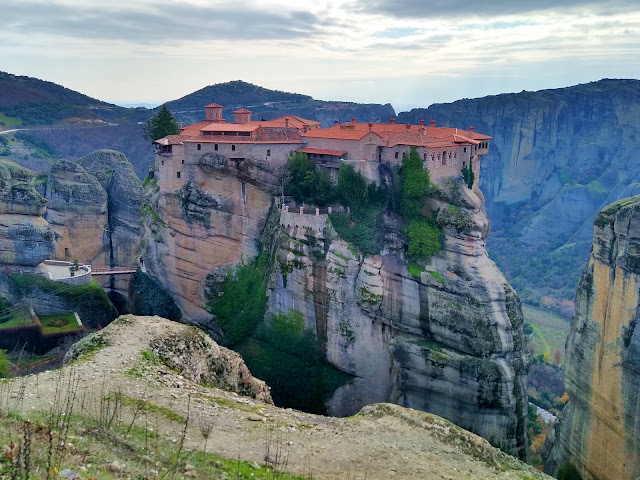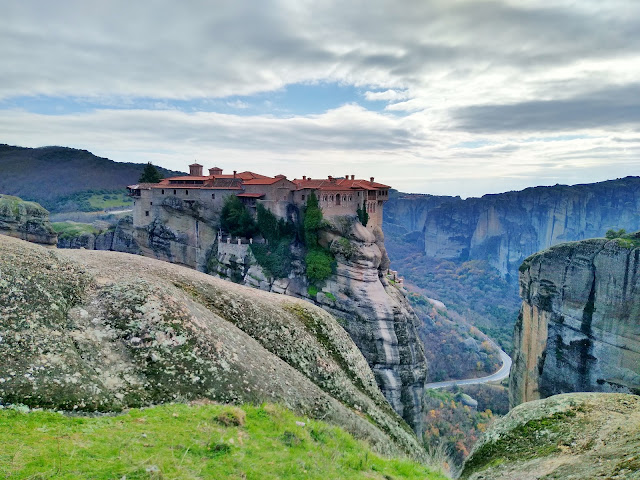Yesterday we drove up to the monastery road that circles in behind the cliffs. This is how most people access the monasteries. There are some hiking trails to get up to them, but we also wanted to drive about 15 kms north to try to hike to the locations of some of the monasteries that don't exist anymore.
And if we wanted to see all of the different viewpoints on our last day in the area, driving was the fastest way to do it.
And a lot of different views there were! Again, be prepared for lots of photos... it's a very photogenic place! And of course you can click on any photo to make it full screen, and click again to zoom in.
Max with the Monastery of the Holy Trinity.
So the first thing we did was to drive the road about 15 kms north. It gained quite a lot in altitude and some of the views were nice, but it was so much more windy and cold up there that we decided we were better off spending our time down by the cliffs.
Looking back towards the cliffs.
This guy has a big farm operation up there.
Looking back towards the Monastery of the Holy Trinity.
And then we got on the scenic monastery road. There are quite a few pull offs and viewpoints.
The Great Monastery on the left, and the Holy Monastery of Varlaam on the right.
What a gorgeous area!
Scenery along the way.
Me!
How did they built this in the 14th century??
Holy Monastery of Varlaam.
Wow!
So many views of the same thing, yet they all look different.
The Great Monsastery.
The Holy Monastery of Varlaam left,
and the Holy Monastery of Rousanos - Saint Barbara lower right.
The Great Monastery.
Unfortunately the Great Monastery is closed Tuesday, Wednesday, and Thursday during the off season, so we couldn't go inside. But we left Max parked at the Varlaam Monastery lot and walked on the road over to the entrance to the Great Monastery just in case there were some different views to be had. There, we found a trail going down, and I checked the map to see that it led to cave, and then back up to the Varlaam Monastery where Max was parked.
So, why not??
Ruth, and the Great Monastery.
Hiking down gave us some more different views.
Look up!
Because the Great Monastery was closed, there was nobody around. So when we took the trail down we were surprised to bump into a young single guy who was on his up. Turned out he was from Vermont but now lives in Dubai. He pointed us in the right direction to the Dragon Cave, and said it was worth going in to explore.
A little rock climbing in the cave.
Looking back to where I am standing near the opening.
A European robin.
"What are you looking at?"
Holy Monastery of Rousanos - Saint Barbara.
We decided to pay the €3 each one final time to go into the Varlaam Monastery. It is also an active monastery, with monks who live there.
They have a nice small museum.
Life of a monk in the old days.
Lots of scrolls and books dating to the 14th century.
Sounds great, where do I sign up??
Priest robe from the 18th century.
There was one big bus load of teenagers.
Otherwise, it was not busy but there were a few other people around. It's a larger monastery so there was lots of space for everyone that day.
View from Varlaam Monastery.
This is actually the entrance to the church.
Make sure you zoom in on the detailed wood carving.
The ceiling.
The floor.
The original wood water barrel.
Ruth, and the tray that collects goods brought up to the monastery.
We had taken this photo earlier of some things being brought up.
They showed a short film that had been taken in 1924. You can watch it here...
Notice how they used that same rope and pulley and tray system to bring monks up to the monastery!
Looking down at the public entrance.
Yet another view.
Looking down at the stairs.
The courtyard.
The monastery closes at 3:00pm, so by that time we were the last ones to leave.
Nobody around.
Looking back up at where we had been.
Yet another view!
What a great day we had. So much to see here, and we're so glad we were able to do it without many people around. If the forecast wasn't calling for even colder weather this coming weekend, we would probably stay another couple of days. There are some other things worth seeing on the opposite side of the river. But, we need to head further south. They are calling for lows of -5C (23F) in this area by the weekend, and that's too cold for our liking!
Late afternoon we got together with fellow motorhomers Joan and Graham from Ireland. They've been following along the same route we took from Bosnia and they finally caught up to us. So we had a few afternoon drinks and before we knew it it was almost 9:00pm. Lots of great talk about travel with like minded people!
Joan and Graham from Ireland.
We've been told of a popular Greek Christmas festival a little south of here in the nearby small city of Trikala so we're going to go down and check that out today. Then on Friday we will put some miles on to get to a little more warmth.
-----------------------------------------------------------------------------------------------------------------------------
Record low deal on the Aerogarden Salad Greens Indoor Garden Kit.
And in Canada...




















































Wow! What amazing pictures. It’s absolutely beautiful. Thank you for sharing with us.
ReplyDeleteThank you! It certainly is a gorgeous area and we were happy to share our pictures from here. :-)
DeleteI'm curious about the stairs that lead to the monasteries. Do they have rails or safety barriers? I noticed in one photo some stone walls next to the stairs, but wondering if they are all like that. Thanks!
ReplyDeleteYes, all of the monasteries but one have stairs to access the monastery and they all have a stone wall that follows the stairs up, these walls have been added to after the fact. When the monasteries were first built the only access was from ladders that were pulled up after the ascent, also there was the net and pulley/winch system, only later were some stairs added that were actually carved into the stone, however now they have modernized things for the tourists to easily access the monasteries safely with proper stairs and stone walls and a few railings in some areas.
DeleteLove the close up photos. The wood carvings remind me of temples in Cambodia where every inch of the temples had carvings. Looking at Google maps, there is definitely a lot to see with hiking trails and water falls in the area. Safe travels.
ReplyDeleteWe are glad that you enjoyed the close up pictures. These wood carvings weren't as intricate as the ones that we saw the day before in the St. Stephan's Monastery but unfortunately we couldn't take photos of them.
DeleteYes, there is a lot to see in the area, we could have easily stayed another day or two but we need to get ahead of the bad weather that is coming on Saturday.
Wow!!! How in the world?? Those wood carvings.....
ReplyDeleteYep, we have asked ourselves that same questions. We just don't understand how they possibly built these monasteries up there way back then!
DeleteThe wood carvings were fantastic but the ones that we saw in the church at St. Stephen's Monastery the day before were even more intricate, unfortunately we couldn't take a picture of those.
This all just kind of blows my mind! This was all built 600 years ago! So amazing! Thanks for taking us there! I thought a lot of the monasteries had farms around and produced crops for themselves but not possible in this situation. Keep safe!
ReplyDeleteIt blows our minds as well, we still can't figure out how they built these monasteries, even just thinking about working on the now, boggles our minds.
DeleteThese monasteries do have their own gardens for growing food and they still grow some of their own food plus they have fruit and olive trees growing on or near the monastery grounds. If you look at the two pictures, one with the caption "How did they built this in the 14th century??" and the other with "Wow!" and click on the pictures twice to zoom in, look to the bottom left you will see terraced sections, some of these are just grass, flowers and bushes now but some have actual gardens in them and I would expect that long ago they were all used for growing produce. You also have to remember that when these were first built there was only one or two people living in them until a little later when they were added on to and more monks lived in them.
Kevin,
ReplyDeleteTruly enjoy your and Ruth's travelog and photos. These monasteries are incredible, especially when you consider their age. I am an architect and I wonder who designed them, and as you stated how did they build them hundreds of years ago? They are built integral to the natural rock formation and look as though they were meant to be there? Safe travels!
Carl
Hi CarlGeo, we are glad that you are enjoying our blog and pictures.
DeleteThese monasteries are definitely amazing but you also have to keep in mind that not all of the monasteries are totally original. When they were first built they may have only had one or two structures built but over the centuries they have been added to and renovated and are still being renovated. It is from our understanding with the research we have found and the literature that they post on these monasteries, that it was the monks themselves that built them, where they got the knowledge on how to build them is beyond us. Here is some info that we found online and it pretty much matches with the info that they have written up in the monastery museums as well. https://en.wikipedia.org/wiki/Meteora#History
Yes, I would love to know more about how they were actually built. I just can't imagine!
ReplyDeleteHere is some info that you can read up on, it pretty much matches with what they had in the monastery museum about how the monasteries came about and how they have been added to over the centuries. https://en.wikipedia.org/wiki/Meteora#History
DeleteGreat blog post! I get up early everday, 5:15. But 3:30, forget it!
ReplyDeleteNope, we couldn't get up at 3:30am and pray for an hour and a half and then go to the church with the other monks and pray some more all before having breakfast. It also looks like they only ate twice a day as well, breakfast and dinner, there is no mention of lunch. A monk's life is definitely not for us!
DeleteWow very impressive!! Really nice photo's and insane how they where able to build these buildings in those days.
ReplyDeleteThe monasteries and the views were more than impressive. We also tried to figure out how they built these places back in those days, it really is mind boggling.
Delete